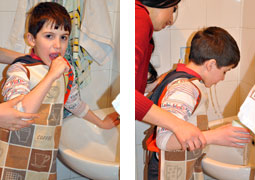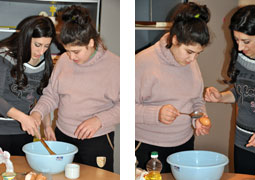According to the American Occupational Therapy Association, occupational therapy is “skilled treatment that helps individuals achieve independence in all aspects of their lives. Occupational therapy assists people in developing the skills for the job of living necessary for independent and satisfying lives.”
 At ICDC, our team of specialized occupational therapists (OTs) will work with your child. In partnership with the primary therapy team, they will assess, apply and monitor each child’s progress towards the gross motor, fine motor, self-help and sensory integration goals set out in the overall education plan.
At ICDC, our team of specialized occupational therapists (OTs) will work with your child. In partnership with the primary therapy team, they will assess, apply and monitor each child’s progress towards the gross motor, fine motor, self-help and sensory integration goals set out in the overall education plan.
OT sessions may consist of one-on-one therapy, groups or co-treatment with speech therapists, physical education or developmental therapists. This type of training plays an important role in fostering independence in the following areas:

-
- Self-help skills, such as self-feeding, grooming and dressing.
- Gross motor skills
- Fine motor skills
- Sensory integration skills
Sensory Integration Therapy as a part of Occupational Therapy
Sensory integration is a component of occupational therapy, and is driven by four key principles:
- The child must be able to successfully meet the challenges that are presented through play (First Right Challenge).
- The child adapts his/her behavior with new and useful strategies in response to the challenges presented (Adaptive Response).
- The child wants to participate because the activities are fun (Active Engagement), and
- The child’s preferences are used to initiate therapeutic experiences within the session (Child Directed).
Sensory integration therapy is based on the assumption that the child is either over-stimulated or under-stimulated by the environment. Therefore, the aim of sensory integration therapy is to improve the ability of the brain to process sensory information so that the child will function better in his daily activities.
Program coordinator, Inessa Harutyunyan
* Case-Smith, J., and H. Miller. 1999. “Occupational Therapy with Children with Pervasive Developmental Disorders.” Am.JOccup.Ther. 53(5):506-513.
* Schaaf, R.C., and L.J. Miller. 2005. “Occupational Therapy Using a Sensory Integrative Approach for Children with Developmental Disabilities.” Ment.Retard.Dev.Disabil.Res.Rev. 11(2):143-148.
* Dempsey, I., and P. Foreman. 2001. “A Review of Educational Approaches for Individuals with Autism.” International Journal of Disability, Development and Education v48 n1 p103-16 Mar 2001.
 INTERNATIONAL CHILD DEVELOPMENT CENTER “They may forget what you said but they will never forget how you made them feel” Carol Buchner
INTERNATIONAL CHILD DEVELOPMENT CENTER “They may forget what you said but they will never forget how you made them feel” Carol Buchner